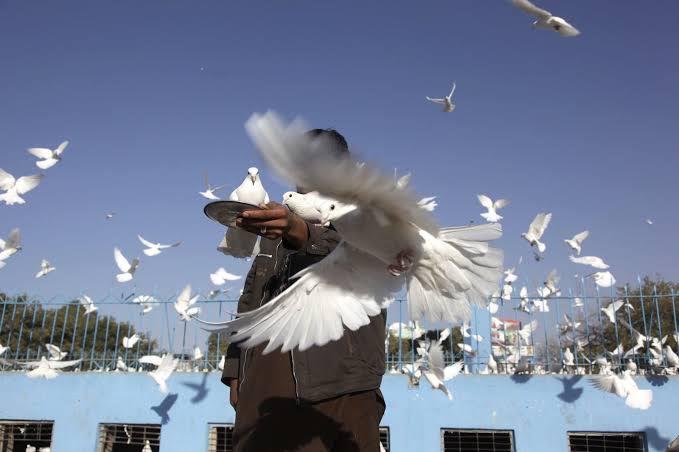(MENAFN- Kashmir Observer) A man feeds the doves at the Imam Ali Shrine in Mazar-e Sharif, Afghanistan, 29 October 2019 (Photo: UNAMA/Flickr)
By Dr. Naseer Ahmad Bhat
PEACE in Afghanistan is a huge ask. The statement is loaded with pessimism and the reasons I will be jotting down in the following paragraphs.
Ever since the takeover of Taliban on August 15, 2021, the challenges in the country have been manifold. The US invasion of the country in fact united the militias in Afghanistan against a single force (USA , the enemy) but after August 15, the country has opened up too many challenges both internal as well as external.
Firstly, the huge internal challenge is the lack of direction for the Taliban. The philosophical boundaries of the sharia law which they want to implement is in their minds an 'ideal construct'. In other words, they don't have any practical model to emulate. Plus, there is lot of disagreement among various scholars of the Islam about the implementation & form of political Islam. Likes of Ghamdi doesn't even consider the implementation of Islam at State level as obligation as vehemently supported by Abul A'la Maududi & Dr Israr Ahmad. It is the same issue that ISKP is locking horns with the Taliban. The claim is that the Taliban is moderate and is lenient on implementing sharia law. IS view about Sharia is even more harsher and extreme.
Women groups in Afghanistan have been demanding a certain share of rights in the new 'caretaker government'. The demand for education rights by women and for lessening the arsh implementation of hijab are two issues where we have seen scattered protests by women groups against militias of Taliban. We have seen two kinds of protests against the imposition gang. What we get from current protests in Iran, Afghanistan and India is that impositions are vehemently opposed by every community & religion. What hijab protests in Iran and India have shown us is that the problem is not with the traditional religious practices but that 'individuals defy all cataloging'. Whether it be Islamic regime of Iran which is dictating terms to Iranian women or Hindutva ideologues issuing fatwas against the girls with hijab—although two extremes—both are categories of imposition.
The Taliban caretaker government hasn't taken other minorities along. Be it Hazaras, modernists, Tajiks or even Sikhs in Afghanistan. It is a Pashtun Government consisting of only those fighters who have been part of jihad against the foreign occupation. Ashley Jackson in his USIP paper shows that during the war against the United States of America, Taliban had two objectives—US withdrawal and imposition of Shariah. They have achieved the first one but the second one is more tedious and difficult one to achieve.
Let us now move on to the external factors which might deter the peace equation in Afghanistan. Peace in Afghanistan is always linked with relations with Pakistan. Pakistan we know can't survive without the blessings of America. Its army requires the goodwill of America. The recent killing of Aiman Al Zawahiri shows that Pakistan is playing foul with the Afghan Taliban. The removal of the Imran Government had US imprints throughout. Pakistan getting closer with the USA means more drone strikes in Afghanistan. This is definitely going to ire the Afghan Taliban and hence the peace equation. After the US withdrawal the most important player in Afghanistan is going to be China. China has huge stakes in Afghanistan, particularly in the context of huge mineral wealth. The country has 16 trillion cubic feet of gas, 1.4 million tons of rare earths, 2.2 billion tons of iron ore and 1.6 trillion barrels of crude oil reserves. This is a humongous amount of wealth in which both the Taliban and China have the stakes.
Taliban since its inception has had good ties with China. It has key stakes in Afghanistan but China wants a 'moderate Taliban' around to work with. China didn't even condemn the fall of Kabul but instead argued that,“we respect the will of the people of Afghanistan”. Chinese Foreign Minister Wang Ye has had meetings with Taliban leadership even before the fall of Kabul.
China faces threats from three extremist groups— Islamic State of Khorasan Province (ISKP), Baluch Liberation Army (BLA) and East Turkestan Islamic Movement (ETIM). Recently, a deadly suicide attack was carried out on Chinese nationals in Karachi. Similarly, ISKP has also claimed Chinese as infidels. In 2014, Abu Bakr Al Bagdadi even vowed to liberate Xinjiang from China. In 2017, Islamic State showed through a video that they are giving training to Uyghur fighters in Iraq.
The above arguments highlight various threats to peace in Afghanistan and why its people are the main sufferers. The pessimism comes from the fact that all the analysis comes from the people who live outside Afghanistan. The youth of Afghanistan who could have been game changers for its growth story have fled from the region to the western countries and even to India. India has good investments in Afghanistan and has stakes in peace in the region. But with the Taliban at helm of affairs, India has been reluctant to engage with them. It is only after serious deliberations and strategic caution that India engaged with Taliban leaders. But given the high stakes of China and interventions of Pakistan, India will be at the periphery when it comes to Afghanistan. One thing India can do is to invest in the young people of Afghanistan and engage its population directly through soft-power in addition to the links with the Taliban. But it is quite a long term vision and the favorable end result is also not guaranteed.
Views expressed in the article are the author's own and do not necessarily represent the editorial stance of Kashmir Observer
The author is Lecturer Degree College, Baramulla
:
























Comments
No comment